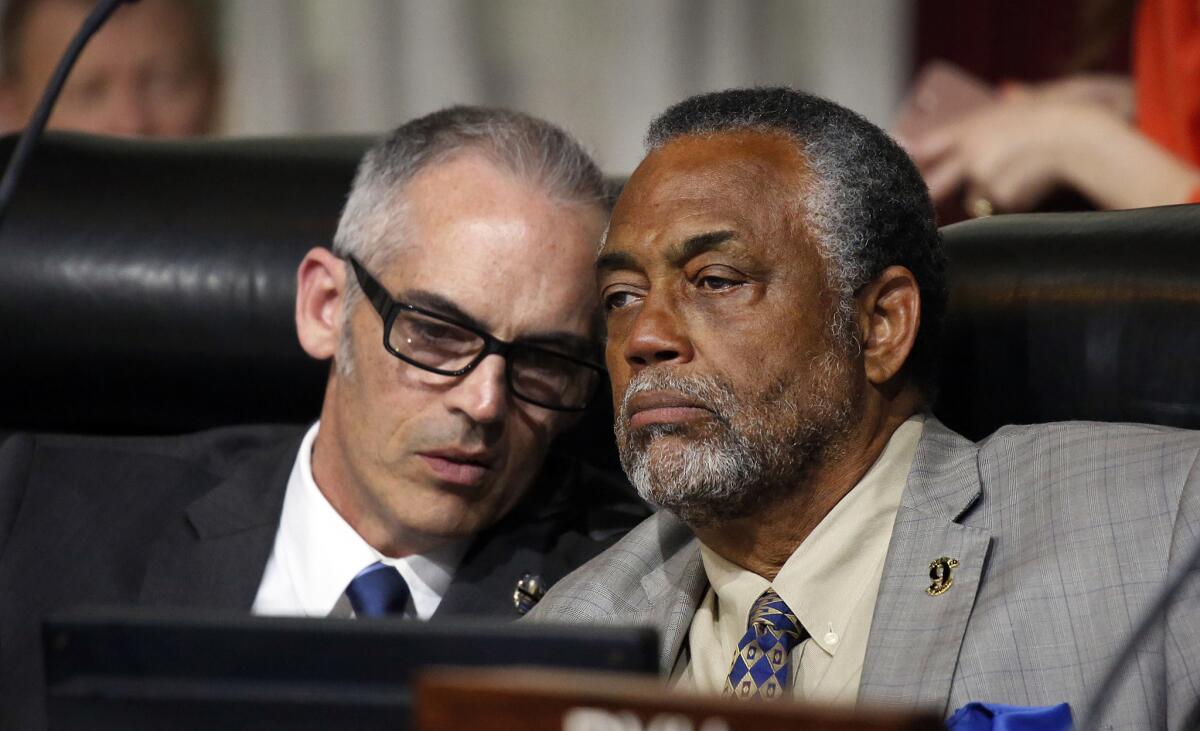L.A. wants to delay when employers may ask about criminal histories

- Share via
A Los Angeles City Council committee voted Tuesday to prohibit most employers in the city from asking about a job applicant’s criminal history until after a conditional offer has been made.
State and local governments in California are already prevented from asking whether a person has ever been convicted of a crime until an initial offer of employment has been made.
President Obama announced in November that the federal government and its contractors would also stop asking about job applicants’ criminal histories in the preliminary stages of the interview process.
The City Council’s Economic Development Committee voted 4-0 to extend that law to businesses with 10 or more employees, as well as to city contractors and subcontractors.
“It’s designed to give someone a fair chance,” said Councilman Curren Price, the committee chairman. “Hopefully they’ll at least get their foot in the door. It’s an opportunity to expand our workforce and provide opportunities to individuals who express a desire to rehabilitate.”
Nine states and 12 other cities, including San Francisco, New York and Chicago, have “ban the box” laws that extend to private employers, according to the National Employment Law Project.
About a dozen people spoke in support of the ordinance Tuesday. Megashia Jackson of Inglewood testified that she lost her cosmetology license after she was imprisoned for marijuana use. Now, even though she’s regained her license, she can’t get a job in a salon, she said.
“I never hear nothing. I’m just putting in applications,” Jackson said. “Now what? I’m running out of cash and I’m scared.”
Supporters of such laws, often known as “ban the box,” say men and women with a criminal conviction are more likely to get a job if they’re able to go through the application and interview process before being asked about their past.
“It’s not an option to just throw people away,” said Councilman Marqueece Harris-Dawson.
The Valley Industry and Commerce Assn. opposed the ordinance and suggested that the law should include clear and specific exemptions for industries that are prohibited from employing anyone with a criminal record.
As written, the law would not apply in instances where an applicant would be required to have or use a gun on the job.
In a study released in June, researchers at the University of Michigan and Princeton University found that job applicants without a criminal history were 62% more likely to get a callback than those with records.
However, the same study found that after municipalities implemented “ban the box,” white applicants were significantly more likely to get a callback than African American candidates.
It’s likely an example of “statistical discrimination,” said Sonja Starr, a professor at the University of Michigan Law School and a co-author of the study. In the absence of information, employers appeared to fall back on stereotypes.
“Essentially the benefits of ban the box, in our experiment, were experienced by the white applicants with records, whose callback rates went way, way up,” Starr said.
“There was very little gain for black applicants with records and meanwhile black applicants without records, their callback rates went way down.”
Under the proposed law, employers who wish to rescind a job offer after finding out about an applicant’s criminal history would have to provide a written report. The applicant would then have the opportunity to appeal the decision.
Employers who violate the law would face a financial penalty of up to $500 for a first offense, $1,000 for a second offense and $2,000 for a third offense.
The ordinance will be heard by the Entertainment and Facilities Committee before it is voted on by the full City Council.
Twitter: @TheCityMaven
More to Read
Sign up for Essential California
The most important California stories and recommendations in your inbox every morning.
You may occasionally receive promotional content from the Los Angeles Times.










